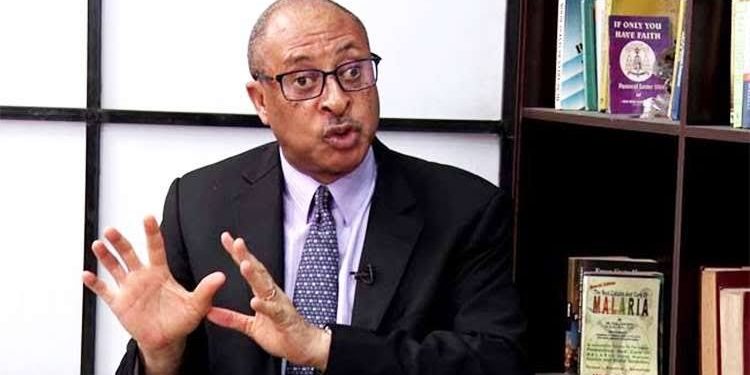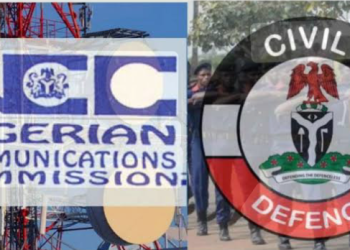*Accuses him of usurping Tinubu’s powers
The Department of State Services (DSS) has filed a lawsuit against Prof. Pat Utomi, a political economist and politician, accusing him of attempting to establish a so-called “shadow government” in Nigeria.
In the suit filed at the Federal High Court in Abuja, the DSS urged the court to declare Prof. Utomi’s alleged move as a violation of the constitution.
The case, with number: FHC/ABJ/CS/937/2025, lists Prof. Utomi, the 2007 presidential candidate of the African Democratic Congress (ADC) as the sole defendant.
In the suit filed on May 13 by Akinlolu Kehinde, Senior Advocate of Nigeria (SAN), the DSS alleged that Prof. Utomi’s plan was designed to incite chaos and destabilize the country.
The security agency described the proposed “shadow government” as not only “a constitutional aberration”, but also “a serious threat to the current democratically elected administration”.
It warned that, if allowed to proceed, such a structure could spark political unrest, fuel inter-group tensions, and inspire separatist groups or other unlawful actors to create similar parallel authorities, thereby endangering national security.
Consequently, the DSS asked the court to declare Utomi’s alleged “shadow government” or “shadow cabinet” unconstitutional, arguing that it amounts to an illegal attempt to establish a rival power structure not recognized by the 1999 Constitution (as amended).
Citing Sections 1(1), 1(2), and 14(2)(a) of the Constitution, the agency sought a judicial declaration affirming that the creation or operation of any governmental body outside the framework of the Constitution as null and void.
It also asked for a perpetual injunction restraining Utomi, along with his agents and associates, from taking any further steps toward establishing or running any form of “shadow government,” “shadow cabinet,” or similar entity not sanctioned by the Constitution.
In its statement of claim, the DSS anchored its prayers on several constitutional provisions, arguing that Prof. Pat Utomi’s actions violated the supreme law of the land. Citing Section 1(1) of the 1999 Constitution (as amended), emphasising that the Constitution is supreme and is binding on all persons and authorities in Nigeria.
It also referred to Section 1(2), which prohibits governance in any part of Nigeria except in accordance with constitutional provisions.
According to the DSS, Section 14(2)(a) further reinforces that sovereignty belongs to the Nigerian people, from whom government derives its authority solely through the Constitution.
The agency contended that Utomi’s proposed “shadow government” has no constitutional basis or legal authority, thereby in breach of these provisions.
In an affidavit in support of the depositions, the DSS identified itself as Nigeria’s principal domestic intelligence and security agency, statutorily mandated to detect and prevent threats to internal security including subversive acts that may undermine national unity, peace, and constitutional order.
The agency reiterated its role in safeguarding the integrity of Nigeria’s lawful institutions.
The DSS stated that through intelligence reports and public sources, including media interviews and statements, it has monitored Prof. Utomi’s public declarations regarding the formation of a “shadow government” or “shadow cabinet.”
This purported body, it noted, is not registered or recognized under Nigerian law and seeks to function as an alternative government structure in contravention of the Constitution.
According to the agency, Utomi has used public platforms, social media, and other channels to promote this entity and question the legitimacy of Nigeria’s democratically elected government. During the inauguration of the so-called shadow cabinet, Utomi reportedly assigned roles such as an Ombudsman and Good Governance portfolio to Dele Farotimi, and formed a Policy Delivery Unit consisting of individuals including Oghene Momoh, Cheta Nwanze, Daniel Ikuonobe, Halima Ahmed, David Okonkwo, and Obi Ajuga, along with a council of economic advisers.
The DSS warned that these actions are capable of misleading the public, undermining confidence in the legitimate government, and fostering disaffection among citizens.
“Intelligence gathered by the agency indicated that Utomi’s activities pose a direct threat to Nigeria’s constitutional democracy,” it stated.
It argued that these actions amount to an unlawful attempt to mimic or usurp executive powers—contrary to Sections 1(1), 1(2), and 14(2)(a) of the Constitution, which vest governance solely in lawfully constituted authorities through democratic processes.
The DSS also noted that the Federal Government has made multiple efforts to engage Utomi and dissuade him from this “unconstitutional path,” including public appeals from the Minister of Information.
However, it stated, Utomi has allegedly remained defiant.
The agency concluded that, “in the interest of national security, justice, and the rule of law, the court should declare the creation and operation of the “shadow government” illegal and unconstitutional”.
As of filing this report, the case has not been assigned to a judge.









